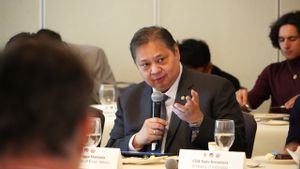JAKARTA - Mining law expert Ahmad Redi believes that the entity that owns IUP/IUPK provides periodic written reports on the work plan and implementation of mineral and coal mining business activities to the Minister, Governor, or Regent/Mayor in accordance with their authority is the domain of civil law, not criminal.
This is in response to the Public Prosecutor (JPU) at the Makassar District Attorney's Office, who charged Helmut Hermawan with deliberately submitting the report as referred to in Article 70 letter e, Article 105 paragraph (4), Article 110, or Article 111 paragraph (1) incorrectly or delivering false information.
On this suspicion, the Public Prosecutor assessed that Helmut violated Article 159 of the Law of the Republic of Indonesia Number 3 of 2020 concerning amendments to Law Number 4 of 2009 concerning Mineral and Coal Mining.
"In a simpler context, our laws and regulations have provided a fairly dynamic, flexible, legal space so don't get a little crime, in the context of the Minerba Law. For example, in the context of articles 177 and 178 of the Job Creation Law, if there are administrative problems, solve them administratively first," said Ahmad Redi in Jakarta, Monday, May 15.
He also always reminds that there is social policy in the context of criminal law. Because, he said, social policy is talking about social defense policies, when it comes to social defense policies, there are criminal policies that are not only penalty approaches.
The approximation of a penalty is the determination of a fair law, but then there is a humane punishment in the context of social justice and civilized in Pancasila. Because in the criminal law of mining from the perspective of Law no. 6 of 2023 concerning Job Creation, we are not talking about Law no. 3 of 2020 and Law no. 4 of 2009, about Minerba mining which is strongly based on a penal approach when administrative violations are correct. We talk about the perspective of the Job Creation Law that if there is a mining crime, the imposition of administrative sanctions is considered to provide more justice and greater benefits for the state than the use of criminal sanctions," he said.
Then, he continued, the Job Creation Law provides such a large space for the use of the ultimum remedium principle and the principle of Una Via in mining.
"Finally, disputes in criminal-dimensional contractual relations can also be resolved through the principle of Una Via. I think this is part of the state's efforts in a criminal context that can provide fair legal certainty but also fair benefits and legal justice for the nation and state of Indonesia," he explained.
Redi added that the spirit of the Job Creation Law was first that Job Creation provided a function not only legal certainty, not only talking about normative benefits, but how social benefits, economic benefits, including equal environmental benefits.
This means, he said, not only in the context of criminal articles, but the criminal article will be tested whether in the context of economic benefits he provides benefits for the state, in the context of social benefits he has provided social justice for the community. Similarly, University of Indonesia's Criminal Law expert Eva Achjani stated that the potential for abuse of power in the Helmut Hermawan case was quite large.
"Don't let that person have been processed in the BAP back and forth or in interviews back and forth but actually the criminal events don't exist or not. So the potential for abuse of power is also large, if we don't see the ultimum remedium as something important as something special from the context of criminal law," said Eva.
According to him, in relation to mining laws or mining issues, the main issue is in the context of licensing. Eva also said that in the context of mining the civil slices were very high.
"Because in the context of mining contract contracts we sometimes see on issues, for example, is there an act against the law or not? Because if we want to use Article 378 of the Criminal Code, it will not be easy," he explained.
SEE ALSO:
"Because if I look at the licensing context, this is actually a mechanism for preventing or controlling the government. Now, if the licensing context is the issue, in the administrative field, then this administrative sanction is something that I think is more appropriate. because the violation of licensing of the authority lies with the government in the state," he said.
In addition, in the context of letter forgery, criminal law has something special.
"Because of what? Because a criminal judge who can prove a letter is fake or not. But indeed in the quality of a letter like what. So for example Perma Number 1 of 56 is already very classic but is often mentioned, it must be read in paragraph 1 and paragraph 2, when then civil takes precedence and when it can then be juxtaposed together with a crime," he said.
"That is why the view on the nature of criminal law which is autonomous compared to other legal fields that form the norms of society because its nature must also be seen, must be considered by law enforcers so that they are careful, in using criminal law facilities. So the choices of administrative sanctions, may become a mechanism that in my opinion is more meaningful than criminal sanctions," he said.
The English, Chinese, Japanese, Arabic, and French versions are automatically generated by the AI. So there may still be inaccuracies in translating, please always see Indonesian as our main language. (system supported by DigitalSiber.id)
















